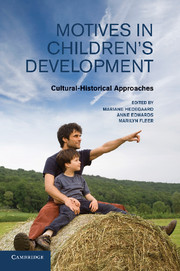Book contents
- Frontmatter
- Contents
- Figures
- Introduction
- Part One Motives, Emotions and Development
- 1 The Dynamic Aspects in Children’s Learning and Development
- 2 The Connection between Motive and Will in the Development of Personality
- 3 Advancing on the Concept of Sense
- 4 Early Stages in Children’s Cultural Development
- Part Two Cultural Practice Motives and Development
- Part Three Creating Conditions for Children’s Engagement
- Index
- References
4 - Early Stages in Children’s Cultural Development
from Part One - Motives, Emotions and Development
Published online by Cambridge University Press: 05 November 2011
- Frontmatter
- Contents
- Figures
- Introduction
- Part One Motives, Emotions and Development
- 1 The Dynamic Aspects in Children’s Learning and Development
- 2 The Connection between Motive and Will in the Development of Personality
- 3 Advancing on the Concept of Sense
- 4 Early Stages in Children’s Cultural Development
- Part Two Cultural Practice Motives and Development
- Part Three Creating Conditions for Children’s Engagement
- Index
- References
Summary
Michel Foucault said, ‘To approach the essence one must go backwards’. My own development as a psychologist can be seen as an inversion of the history of the Soviet psychology: First there was the cultural-historical approach; later – the psychological theory of activity. I started with the latter and am slowly approaching the former now. From my earlier research on sensory-motor skills and perceptual actions I had moved to studies of the development of visual image, visual thinking and visual memory; finally, through my fairly late interest in poetry and psychology of art, I have turned my attention to the word and culture – at last.
Naturally, I went back to re-reading Vygotsky. This time, I found myself puzzled by his description of a child as having natural ‘lower’ psychological functions that develop into higher mental functions only as a result of interiorisation and intellectualisation. I felt that this view contradicted his own theory of cultural-historical development and was rather similar to the gradual animation of a statue – a metaphor for human development proposed by the eighteenth-century French philosopher Etienne Bonnot de Condillac in his book Traitédes sensations. Thus, I decided to take a closer look at child development in the light of my current understanding of the cultural-historical approach and the psychological theory of activity.
- Type
- Chapter
- Information
- Motives in Children's DevelopmentCultural-Historical Approaches, pp. 63 - 76Publisher: Cambridge University PressPrint publication year: 2011



